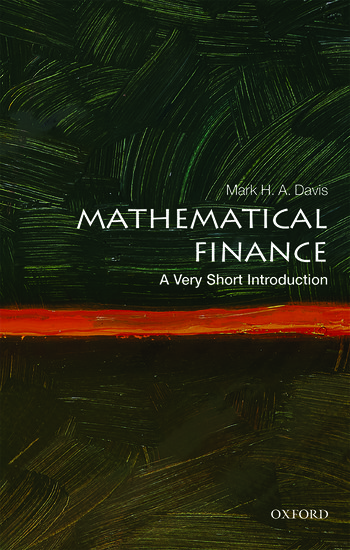Home >
A Very Short Introduction >
Mathematical Finance (Business & Economics)
A Very Short Introduction | Business & Economics
Mathematical Finance
ISBN: 9780198787945
Series: A Very Short Introduction
Mathematical Finance (Business & Economics)
A Very Short Introduction Mathematical Finance (Business & Economics) Media > Books > Non-Fiction > Education Books Expect Delays of Up to 4 Weeks| Order Below |
ISBN
9780198787945 (10-digit ISBN: 0198787944)
- Description
- Key Features
- Series Description
- Table of Contents
- Offers an overview of mathematical finance today
- Discusses developments to mathematical finance in the wake of the 2008 financial crash
- Introduces arbitrage theory, and how it is key to pricing financial contracts, to credit trading, fund management, and the setting of interest rates
- Accessible to readers with a basic knowledge of statistics and calculus
In recent years the finance industry has mushroomed to become an important part of modern economies, and many science and engineering graduates have joined the industry as quantitative analysts, with mathematical and computational skills that are needed to solve complex problems of asset valuation and risk management. An important parallel story exists of scientific endeavour. Between 1965-1995, insightful ideas in economics about asset valuation were turned into a mathematical 'theory of arbitrage', an enterprise whose first achievement was the famous 1973 Black-Scholes formula, followed by extensive investigations using all the resources of modern analysis and probability. The growth of the finance industry proceeded hand-in-hand with these developments. Now new challenges arise to deal with the fallout from the 2008 financial crisis and to take advantage of new technology, which has revolutionized the practice of trading.
This Very Short Introduction introduces readers with no previous background in this area to arbitrage theory and why it works the way it does. Illuminating pricing theory, Mark Davis explains its applications to interest rates, credit trading, fund management and risk management. He concludes with a survey of the most pressing issues in mathematical finance today.
Oxford's Very Short Introductions series offers concise and original introductions to a wide range of subjects--from Islam to Sociology, Politics to Classics, Literary Theory to History, and Archaeology to the Bible.
Not simply a textbook of definitions, each volume in this series provides trenchant and provocative--yet always balanced and complete--discussions of the central issues in a given discipline or field. Every Very Short Introduction gives a readable evolution of the subject in question, demonstrating how the subject has developed and how it has influenced society. Eventually, the series will encompass every major academic discipline, offering all students an accessible and abundant reference library.
Whatever the area of study that one deems important or appealing, whatever the topic that fascinates the general reader, the Very Short Introductions series has a handy and affordable guide that will likely prove indispensable.
Please note: As this series is not ELT material, these titles are not subject to discount.
Preface
1: Money, banking, and financial markets
2: Quantifying risks
3: The classical theory of option pricing
4: Interest rates
5: Credit risk
6: Fund management
7: Risk management
8: The banking crisis and its aftermatch
Epilogue
Further reading
Index
In recent years the finance industry has mushroomed to become an important part of modern economies, and many science and engineering graduates have joined the industry as quantitative analysts, with mathematical and computational skills that are needed to solve complex problems of asset valuation and risk management. An important parallel story exists of scientific endeavour. Between 1965-1995, insightful ideas in economics about asset valuation were turned into a mathematical 'theory of arbitrage', an enterprise whose first achievement was the famous 1973 Black-Scholes formula, followed by extensive investigations using all the resources of modern analysis and probability. The growth of the finance industry proceeded hand-in-hand with these developments. Now new challenges arise to deal with the fallout from the 2008 financial crisis and to take advantage of new technology, which has revolutionized the practice of trading.
This Very Short Introduction introduces readers with no previous background in this area to arbitrage theory and why it works the way it does. Illuminating pricing theory, Mark Davis explains its applications to interest rates, credit trading, fund management and risk management. He concludes with a survey of the most pressing issues in mathematical finance today.
Key Features
- Offers an overview of mathematical finance today
- Discusses developments to mathematical finance in the wake of the 2008 financial crash
- Introduces arbitrage theory, and how it is key to pricing financial contracts, to credit trading, fund management, and the setting of interest rates
- Accessible to readers with a basic knowledge of statistics and calculus
Series Description
Oxford's Very Short Introductions series offers concise and original introductions to a wide range of subjects--from Islam to Sociology, Politics to Classics, Literary Theory to History, and Archaeology to the Bible.
Not simply a textbook of definitions, each volume in this series provides trenchant and provocative--yet always balanced and complete--discussions of the central issues in a given discipline or field. Every Very Short Introduction gives a readable evolution of the subject in question, demonstrating how the subject has developed and how it has influenced society. Eventually, the series will encompass every major academic discipline, offering all students an accessible and abundant reference library.
Whatever the area of study that one deems important or appealing, whatever the topic that fascinates the general reader, the Very Short Introductions series has a handy and affordable guide that will likely prove indispensable.
Please note: As this series is not ELT material, these titles are not subject to discount.
EASY ORDER FORM
PRICES LISTED INCLUDE CONSUMPTION TAX
Price Before Tax:
¥1,790


